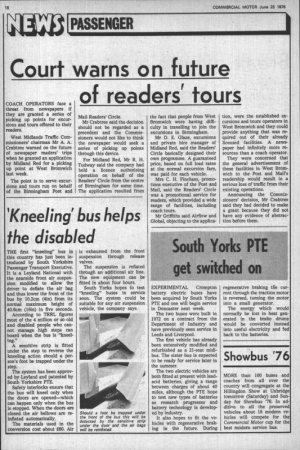Court warns on future of readers' tours
Page 20

If you've noticed an error in this article please click here to report it so we can fix it.
COACH OPERATORS face a threat from newspapers if they are granted a series of picking up points for excursions and tours offered to their readers.
West Midlands Traffic Commissioners' chairman Mr A. A. Crabtree warned on the future of newspaper readers' trips when he granted an application by Midland Red for a picking up point at West Bromwich last week.
The point is to serve excursions and tours run on behalf of the Birmingham Post and Mail Readers' Circle.
Mr Crabtree said the decision should not be regarded as a precedent and the Commissioners would not like to think the newspaper would seek a series of picking up points through this device.
For Midland Red, Mr R. H. Tudway said the company had held a licence authorising operation on behalf of the Readers' Circle from the centre of Birmingham for some time. The application resulted from the fact that people from West Bromwich were having difficulty in travelling to join the excursions in Birmingham.
Mr D. E. Glaze, excursions and private hire manager of Midland Red, said the Readers' Circle basically designed their own programme. A guaranteed price, based on full load rates at the normal excursion fare, was paid for each vehicle.
Mrs C. H. Fincham, promotions executive of the Post and Mail, said the Readers' Circle was a promotional service for readers, which provided a wide range of facilities, including coach tours.
Mr Griffiths said Airflow and Global, objecting to the applica tion, were the established excursions and tours operators in West Bromwich and they could provide anything that was required out of their already licensed facilities. A newspaper had infinitely more resources than a coach operator.
They were concerned that the general advertisement of these facilities in West Bromwich to the Post and Mail's readership would result in a serious loss of traffic from their existing operations.
Announcing the Commissioners' decision, Mr Crabtree said they had decided to make a grant because they did not have any evidence of abstraction before them.




















































































